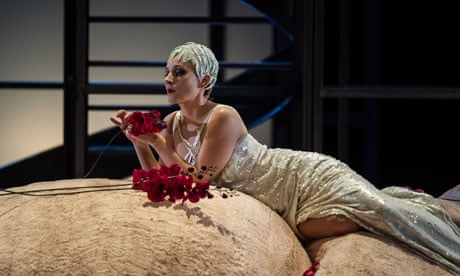Welsh National Opera's only previous production of Lulu, in 1971, was the first ever by a British company. The new one is a landmark too, for it opens the first of WNO's thematic seasons planned by its new artistic director David Pountney, who is also responsible for this staging, with designers Johan Engels (sets) and Marie-Jeanne Lecca (costumes). It's a remarkable achievement, the most penetrating and imaginative version of Berg's unfinished opera yet seen in these islands.
The success is as much musical as theatrical. Lothar Koenigs conducts the intricate, many-layered score with a perfectly rendered mix of modernist clarity and romantic warmth. Rather than the Cerha completion of the third act that's usually performed nowadays, Koenigs and Pountney have opted for a more recent one by Eberhard Kloke. This allows them to make cuts in the problematic first scene of the third act, shortening it by about 10 minutes, though perhaps losing a bit of the dramatic shape in the process.
In Engels' semi-abstract set of metal rails and ladders, Pountney's production preserves not only the surrealist elements in the plot, but all its absurdist trappings; it's a black comedy, and one which gets blacker and bleaker as it goes on, holding up a mirror to the excesses of human behaviour. There's no film sequence at the midpoint of the second act, but a scene and costume change in full view of the audience, as if emphasising the artificiality of the whole savage fable. In it the human zoo that Richard Angas's Animal Tamer introduces in the prologue is never far away, and it's very much in evidence in the opening scene of the third act where the Paris casino is thronged with animal-headed punters. With a patch over one eye, broad-brimmed hat and carrying a spear, Angas's character unmistakably recalls the Wanderer from Wagner's Siegfried, and he is also the enigmatic Schigolch, who may be Lulu's father or may once have been her pimp, and is here a gentleman tramp, with top hat and ragged tailcoat.
Angas's wonderfully observed performances are typical of a cast in which every character seems precisely realised. It's fulcrum is Marie Arnet's Lulu, the perfectly poised, ice-cool blank on which every man she encounters can create his own fantasy; her performance is both wonderfully controlled and superbly sung. Ashley Holland's Dr Schoen is the epitome of the sinister, powerful businessman the perfect complement to his other role as Jack the Ripper who brutally murders Lulu in the final scene.
Peter Hoare's Alwa, straitjacketed and wearing a white rabbit's head by the end, epitomises the weakness of a man caught between his father and the woman with whom he's infatuated, while Natascha Petrinsky's glamorous Geschwitz is pathetically touching as the only person selflessly devoted to Lulu. Pountney's presentation of all this human folly is unsparing and crystal-clear; ultimately it's Berg's ravishing and fabulously presented score that gives it all a human dimension.

Comments (…)
Sign in or create your Guardian account to join the discussion